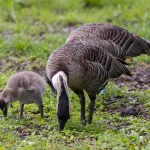Toxoplasmosis, an infection spread only in the feces of feral cats, is likely what killed a nēnē gosling in Liliʻuokalani Park and Gardens last month.
The DLNR Division of Forestry and Wildlife (DOFAW) sent the diseased bird to the United States Geological Survey (USGS) National Wildlife Health Center for a necropsy (animal autopsy).
Raymond McGuire, the DOFAW biologist who collected the gosling and sent it to the lab to determine cause of death, said nēnē have particularly strong familial bonds and there’s one thing about this gosling’s death that is especially sad. The gosling’s mother, tagged as NTC, was the same bird that had another chick taken from her by a woman at Hilo park in March, 2023.
In a press release DLNR Chair Dawn Chang said, “This tragic incident highlights the problem of having feral cat colonies in areas that are known habitat for endangered or threatened species. Toxoplasmosis, or ʻtoxo’ for short, according to the USGS, continues to be the chief cause of death for infectious diseases for nēnē and critically endangered Hawaiian monk seals. We must keep cats out of native wildlife habitats or we’re likely to see more deaths among Hawai‘i’s State Bird population,”
Last year at the Queen’s Marketplace in Waikoloa, DOCARE officers ordered feral cat feeding to stop, at the request of the shopping center’s owners as nēnē were eating cat food right alongside a large population of wandering cats.
The nonprofit Friends of Liliʻuokalani Gardens put up signs cautioning visitors that it is illegal to touch, harass, feed, or harm a nēnē.
DLNR Photo
